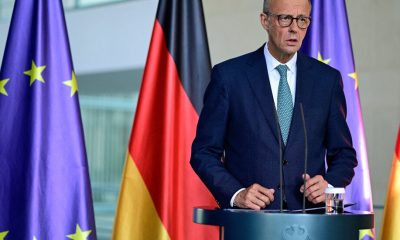International
Germany relaxes EU Blue Card rules to attract skilled workers

Germany relaxes EU Blue Card rules to attract skilled workers
Germany is making it easier for skilled workers to live and work in the country by simplifying the EU Blue Card process.
The EU Blue Card, which grants non-EU nationals the right to live and work in Germany, has traditionally been difficult to obtain due to high salary thresholds and limited job categories.
However, recent changes to the policy aim to address these challenges and make Germany a more attractive destination for international talent.
DAAD Scholarship reports that Germany has lowered the salary requirements and expanded the list of eligible professions for the EU Blue Card, providing more opportunities for skilled workers.
These changes are expected to help Germany address its ongoing shortage of skilled labour in sectors such as healthcare, IT, and engineering.
New salary requirements for Blue Card applicants
One of the biggest changes to the EU Blue Card program is the reduction in the minimum salary requirement for applicants. Previously, candidates needed to earn a high salary to qualify for the Blue Card, but now the bar has been lowered to make it more accessible.
Currently, applicants must earn at least €45,300 gross annually, which is about 1.5 times the average German salary. However, the minimum salary is even lower for those in high-demand fields.
READ ALSO:
- Baltasar Engonga: I dated him for four years, lady says, sues for betrayal
- Biden, Trump set for rare direct encounter at White House this week
- Why I married my husband – Mercy Aigbe
If your profession is on Germany’s shortage occupation list—such as healthcare, IT, or engineering—the minimum salary drops to €41,041.80.
This change aims to attract skilled workers to areas where there is a significant labour shortage.
Expanded list of eligible professions
DAAD reports that Germany is actively seeking workers in various sectors, and as part of the 2024 changes, the list of eligible professions for the Blue Card has been expanded.
In addition to IT, healthcare, and engineering, the new rules open up opportunities for other skilled professionals to apply for a Blue Card. This includes sectors such as natural sciences, technology, and management.
The expansion of eligible professions indicates that more workers with specialized skills will now be able to take advantage of the Blue Card program.
It also reflects Germany’s growing demand for talent in a wide range of industries as the country looks to maintain its competitive edge in the global market.
Benefits for recent graduates
- The new rules also offer significant benefits for recent university graduates. According to reports, if you have graduated within the past three years, you can now apply for the EU Blue Card with a lower salary requirement of €41,041.80, regardless of the field you studied.
- This makes it easier for recent graduates to find employment in Germany and begin their careers abroad.
- Furthermore, the German government is encouraging young professionals to move to the country and help fill skill gaps in various industries.
IT professionals can qualify without a degree
- Reports inform on another important change in the Blue Card program, which is that IT professionals with at least three years of relevant work experience can now apply for the EU Blue Card, even if they do not have a university degree.
- This change recognizes the value of practical experience and opens the door to IT professionals who may not have followed a traditional academic path but have built up significant skills through work.
- This policy shift is a direct response to the growing demand for skilled IT workers, especially in fields like software development, cybersecurity, and data management.
- Germany hopes that by relaxing the educational requirements for IT professionals, it will be able to attract more talent to the tech sector.
Streamlined application process
- In addition to the changes in salary and eligibility criteria, Germany is also making the Blue Card application process faster and more straightforward.
- The new system is designed to reduce the amount of paperwork and processing time, making it easier for applicants to get their Blue Card and start working in Germany sooner.
- This will likely be a welcome change for many, as it reduces the time spent on administrative tasks and allows candidates to focus more on settling into their new roles and life in Germany.
- The changes to the EU Blue Card are designed to make it easier for skilled workers to contribute to Germany’s economy and fill key roles in industries that are essential to the country’s future growth, DAAD informs.
- By lowering salary requirements, expanding eligible professions, and streamlining the application process, Germany hopes to draw in top talent and maintain its status as a global leader in innovation and economic strength.
Germany relaxes EU Blue Card rules to attract skilled workers
International
Trump Halts Minnesota Immigration Crackdown After Fatal Shootings, Protests

Trump Halts Minnesota Immigration Crackdown After Fatal Shootings, Protests
The Trump administration has officially halted Operation Metro Surge, a controversial immigration enforcement operation in Minnesota, following widespread protests, political backlash, and the deaths of two U.S. citizens. The decision was announced by Tom Homan, the U.S. “border czar,” who confirmed that President Donald Trump approved ending the monthslong crackdown.
Operation Metro Surge, launched in December 2025, focused on the Minneapolis–St. Paul metropolitan area, deploying nearly 3,000 federal immigration officers at its peak. The operation aimed to detain undocumented immigrants, which the Department of Homeland Security (DHS) described as targeting “criminal illegal aliens.” However, reports indicate that many detainees had no criminal records, including children and U.S. citizens, raising concerns about the operation’s scope and fairness.
- Army University Professor Dies in Boko Haram Captivity After Nearly One Year
- MURIC Calls Proposed US Sanctions on Nigerian Muslims ‘Lopsided’
- Supreme Court Affirms Muslim Students’ Right to Worship at Rivers State University
The crackdown drew intense public opposition after anti-ICE protesters Renée Good and Alex Pretti were fatally shot during separate incidents in Minneapolis. The shootings intensified calls for accountability and prompted local and national criticism of federal enforcement tactics.
In a statement, Homan said, “I have proposed and President Trump has concurred that this surge operation conclude.” He noted that a drawdown of federal personnel had already begun, with a smaller contingent remaining temporarily to transition operations and coordinate with local authorities.
During the operation, DHS reported over 4,000 arrests, though critics highlighted the disproportionate impact on communities and families, emphasizing the humanitarian and civil liberties concerns arising from the surge.
Minnesota officials, including Governor Tim Walz and Minneapolis Mayor Jacob Frey, welcomed the decision, calling the operation an overreach that harmed communities and strained trust between law enforcement and residents. Civil rights groups also praised the halt but urged comprehensive immigration reforms to prevent future abuses.
The end of Operation Metro Surge marks a significant development in the national debate over immigration enforcement, sanctuary policies, and federal authority, highlighting the challenge of balancing border security with human rights and community safety.
Trump Halts Minnesota Immigration Crackdown After Fatal Shootings, Protests
International
Russia Escalates Digital Control with Attempted WhatsApp Block

Russia Escalates Digital Control with Attempted WhatsApp Block
WhatsApp has accused the Russian government of trying to completely block its messaging service in the country, a move aimed at steering users toward the state-backed app MAX. The Meta-owned platform said the effort, reported on February 12, 2026, threatens over 100 million users and undermines private, encrypted communication in Russia.
In a statement, WhatsApp said: “Today the Russian government attempted to fully block WhatsApp in an effort to drive people to a state-owned surveillance app. Trying to isolate over 100 million users from private and secure communication … can only lead to less safety for people in Russia. We continue to do everything we can to keep users connected.”
READ ALSO:
- Tumbler Ridge Massacre: Canada Investigates Shooter’s Mental Health, Police History
- Ex-Acting AGF Nwabuoku Admits Diverting N868.4 Million to Private Firms
- Kwankwasiyya Urges US Congress to Drop Kwankwaso’s Name from Bill
The attempt is part of a broader crackdown on foreign tech platforms in Russia. Authorities have previously restricted access to Facebook, Instagram, and targeted other services like Telegram. Reports indicate that Roskomnadzor, Russia’s communications regulator, removed WhatsApp from its national internet directory, forcing users to rely on VPNs to access the platform. Critics warn that such measures are designed to expand state surveillance and control over digital communication.
The government is actively promoting MAX, a domestic “super-app” similar to China’s WeChat, which combines messaging with other services. Rights advocates caution that the push toward MAX could compromise privacy protections that platforms like WhatsApp provide. Meanwhile, Kremlin officials have indicated that WhatsApp and other restricted apps could be restored if Meta complies with local data storage and regulatory laws.
WhatsApp’s statement emphasizes that the company will continue to work to keep its service accessible where possible, but the attempted block highlights Russia’s ongoing effort to enforce digital sovereignty and shift users toward state-controlled technology platforms.
Russia Escalates Digital Control with Attempted WhatsApp Block
International
Tumbler Ridge Massacre: Canada Investigates Shooter’s Mental Health, Police History

Tumbler Ridge Massacre: Canada Investigates Shooter’s Mental Health, Police History
Canadian authorities are intensifying investigations into the mental health history and prior police interactions of Jesse Van Rootselaar, the 18-year-old who carried out a deadly mass shooting in the remote mining town of Tumbler Ridge, British Columbia, on February 10, 2026. The tragedy has left the small community in mourning and raised national questions about gun control, mental health support, and law enforcement interventions.
According to RCMP Deputy Commissioner Dwayne McDonald, authorities are still unclear on the motive behind the attack, which is one of the deadliest school shootings in Canadian history. Van Rootselaar, a transgender woman who had dropped out of Tumbler Ridge Secondary School four years ago, first killed her mother and stepbrother before opening fire at the school, where she shot six more victims. The shooter later took her own life at the scene.
Investigators have confirmed that Van Rootselaar was known to police and had previous interactions with the public health system due to mental health concerns. Authorities are reviewing prior incidents, including earlier firearms seizures and her lapsed gun licence, to understand how warning signs were addressed before the massacre. British Columbia Premier David Eby said officials are working with the health system to determine “what interactions may have taken place” in the past.
READ ALSO:
- Ex-Acting AGF Nwabuoku Admits Diverting N868.4 Million to Private Firms
- Kwankwasiyya Urges US Congress to Drop Kwankwaso’s Name from Bill
- Liverpool Edge Sunderland 1-0 to Halt Impressive Home Streak
The victims include a 39-year-old female teacher and five students aged 12 and 13, with one child, 12-year-old Maya Gebala, in critical condition after trying to lock herself and classmates in a library during the attack. First responders arrived within minutes, but the scale of the violence left the tight-knit community of about 2,700 residents reeling. Hundreds gathered for a candlelight vigil to honour those killed and injured.
Prime Minister Mark Carney addressed parliament, describing Tumbler Ridge as a resilient, compassionate community of miners, teachers, and construction workers, and emphasised the need to learn from the tragedy. Flags across Canada have been lowered to half-staff for seven days in remembrance of the victims. Britain’s King Charles and Queen Camilla also expressed shock and sorrow over the massacre.
Schools in the area will remain closed for the remainder of the week as authorities continue their investigation into Van Rootselaar’s mental health background, police interactions, and access to firearms, seeking to understand how similar tragedies can be prevented in the future.
Tumbler Ridge Massacre: Canada Investigates Shooter’s Mental Health, Police History
-

 metro2 days ago
metro2 days agoIKEDC Sets Feb 20 Deadline for Customers to Submit Valid IDs or Face Disconnection
-

 Education2 days ago
Education2 days agoSupreme Court Affirms Muslim Students’ Right to Worship at Rivers State University
-

 metro1 day ago
metro1 day agoLagos Police Launch Manhunt for Suspect in Brutal Ajah Murder
-

 News1 day ago
News1 day agoAso Rock Goes Solar as Tinubu Orders National Grid Disconnection
-

 Business3 days ago
Business3 days agoDangote Refinery Slashes Petrol Price to ₦774, Ends PMS Bonus Window
-

 Business2 days ago
Business2 days agoNaira Could Trade Below ₦1,000/$ With Dangote Refinery at Full Capacity — Otedola
-

 metro3 days ago
metro3 days agoKwara, Katsina Bloodshed: TMC Condemns Attacks, Dismisses ‘Jihadist Preacher’ Claims
-

 metro2 days ago
metro2 days agoArmy University Professor Dies in Boko Haram Captivity After Nearly One Year













